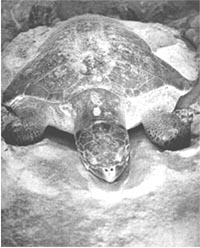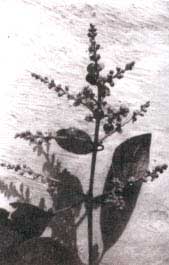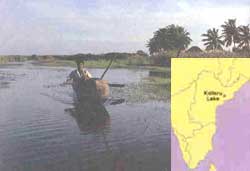INDIA
• India was one of the signatories to the draft international convention on liability and compensation for damages in connection with the carriage of hazardous and rundous substances by sea,
• India was one of the signatories to the draft international convention on liability and compensation for damages in connection with the carriage of hazardous and rundous substances by sea,

After initial doubts over whether the turtles would retain Orissa as the site of their annual nesting exercise, the reptiles return for the second consecutive year

Halophytes plants growing on saline soil could be India's Answer to the problems of salt desert and wasteland reclamation, besides Being an economic boon

They thought saving the animals would help save the Alp s ecology. They were wrong

A pristine lake that once drew birds of several species today lies clogged with weeds, a victim of unplanned economic development.

SCIENTISTS in India have developed a genetic probe to prevent poaching of the endangered one-horned rhinoceros. The probe, developed by scientists at the New Delhi-based National Institute of

J&K proposes prescription for reviving medicinal plants

The shores of the Andaman and Nicobar islands are losing their magnificent coral reefs because of heavy siltation caused by developmental activities
Record Beach Litter Threatens Marine Wildlife UK: April 10, 2008 LONDON - Plastic litter on Britain's beaches has reached record levels, endangering whales, dolphins and seabirds, an environmental charity survey said on Thursday. The Marine Conservation Society, which campaigns for cleaner beaches and seas, said plastic litter has increased by 126 percent since its first survey in 1994. Scores of marine wildlife species, including seals and turtles, have died after eating plastic or drowning after getting tangled in debris or old fishing nets, it said.
Environmental management does not mean changing your light bulbs to use less energy. It means looking at everything you use to see what is beingdestroyed. Have you ever looked at the ingredients in your make up or lotions? Does your moisturizer or lipstick carry the word squalene in the ingredient list? If your answer is yes, then you are partly responsible for destroying the oceans. Squalene is oil derived from the liver of deep-sea sharks. 270,000 sharks are killed every day just for their fins and oil. The oil from their livers goes to the cosmetic industry and the fins go for soup. This enormous and mindless genocide has made 307 species of sharks endangered. In fact, the total number of sharks left in the ocean is ten percent of what they were in 1950. Deep-sea sharks (those living in ocean depths of 300 to 1500 metres) have especially large reserves of squalene since their livers comprise one-third of the weight of the entire animal. So, most deep-sea sharks are caught only for their oil. The excessive catching of these sharks has caused the dramatic population declines of certain species. Some repeatedly targeted shark species are the Aizame shark (dog fish) Leafscale Gulper Shark, and the Gulper, Kitefin and Portuguese dogfish which live between 1300 to 1500 m below sea level. Deep sea sharks grow very slowly, mature late in life and have only a few young in their entire lives. They take long breaks between reproductive cycles, rendering them extremely vulnerable to over-fishing. These sharks are a target species in many industrial fisheries and are frequently caught by fishermen targeting other species. As a result deep sea sharks are at extreme risk and their numbers will take long to recover. The ocean is a very fragile ecosystem. Sharks are apex predators and oceanic food chains are dependent on them. The ocean will implode without predators and our dependence on ocean creatures will impact us tremendously as well. It is immoral to let entire species disappear for the dubious benefits of personal skin specially when there is a renewable alternative in olives. The cosmetic industry has a duty to educate consumers about what they are putting on their faces. Squalene is an oil used in cosmetic products ranging from anti aging creams to lip-gloss to give them a smooth finish and make your skin glisten. It is found in all animals, humans and some plants. It is the sebum oil that your body produces at the root of its hair. In fact it is the same composition as ear wax so it would be cheaper to use that rather than killing such an important species and rubbing its liver oil into your skin. The point is, it is unnecessary. It is not a vitamin or a mineral, it is just oil. Shark-based squalene has a readily available substitute in the market that comes from a purely vegetable origin. Squalene can be obtained from olives and it is of better quality than animal-based squalene and is less expensive as well. Squalene is also found in amaranth seeds, rice bran, wheat germ, fungi and date palm. Vegetable derived squalane is cheaper to produce, more stable against oxidation, of a higher food grade and more compatible with skin than that produced from shark-liver. Oceana is the world's largest international ocean environmental group and is campaigning to end the use of squalene in cosmetic products. As a result some companies have promised to stop using it from this year. Unilever has promised to replace shark derived squalene with plant oil in Ponds and Dove by April 2008 ( However they will still use it in other products). With this decision, Unilever has joined other European-based cosmetic companies that informed Oceana that they do not use this product from threatened animals and prefer sustainable plant-based sources. L'Oreal is also phasing-out products containing shark-based squalene. Other companies are Boots, Clarins, Sisley and La Mer (an Estie Lauder brand. Squalene 'Health Capsules' are another scam. Fly by night companies use the internet to advertise 'pure squalene oil' and 'squalene capsules' making claims about its anti-oxidant properties something consistently debunked by scientists. Among the nonsensical claims made, are those saying that sharks defend themselves therefore their liver oil will make the human body defend itself (I actually read this on an Australian selling site). Other claims are that squalene helps protect against substances that weaken or damage our natural defense systems. There is no clinical evidence to support this. It is is an oil which keeps skin soft - mustard, coconut, olive and all the other oils do. When the cosmetic industry talks about corporate social responsibility, they should start with using ingredients responsibly. Here is no point killing part of the earth and then giving a few dollars to feed children in Ethiopia or creating AIDS awareness. (To join the animal welfare movement contact gandhim@nic.in).
<p>Nepal has been ranked 139th in the Environmental Performance Index 2014, which assessed 178 countries across the world. Read more in this January 2014 edition of the Monthly Overview on State of Environment, Nepal</p>

PATTERNS of the Wild was screened at the India International Centre in New Delhi on February 24, 1996. It is a documentary on the primal theme of the preservation of wildlife and biodiversity.

Arid and semi arid zone trees, especially those belonging to the genera prosopis, have become threatened species.

Are isolated refuges the only way to protect biodiversity?

Indian fisherfolk are up in arms against the foreign trawlers that have been permitted to fish in India's coastal waters by the Indian government. The leaders of fisherfolk associations from 9

Jamaican iguana, a lizard, believed to be extinct for nearly 50 years, has been accidentally rediscovered in the Hellshire Hills of Jamaica. This inspired an intensive efforts to save both the
Dams in the <font class='UCASE'>us </font> are being dismantled to restore riverine ecosystems
Experts have asked for a second dolphin reserve in Pakistan to house the blind river dolphin in the wake of a study on the impact of a hydroelectric station at the Tunsa barrage

Conservationists in Tasmania, Australia, have locked horns with the fishing industry to protect the orange roughy fish species. The Humane Society International (hsi) has issued a call for
RIVER dolphins - often the targets of attack from fishermen who kill them for the oil in their fat - have finally come in for attention from the Asian River Dolphin Committee, the